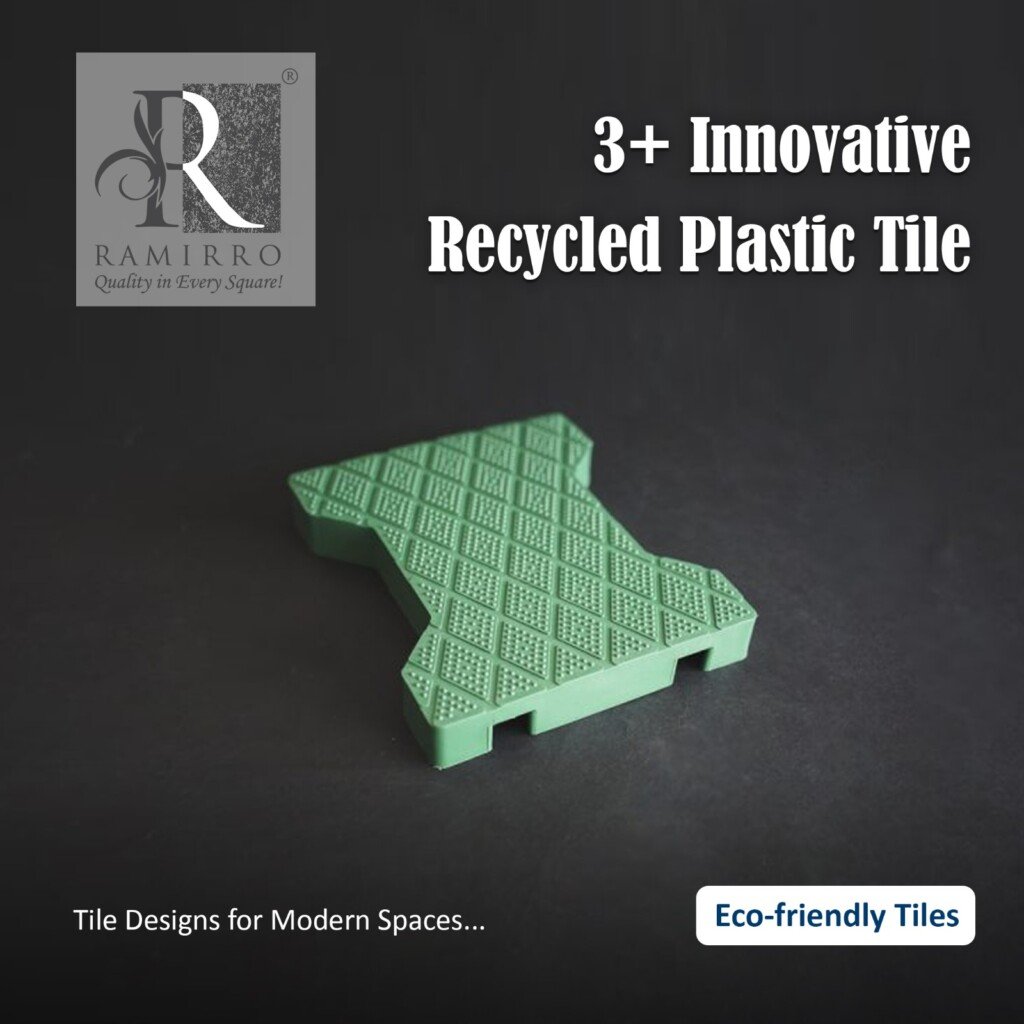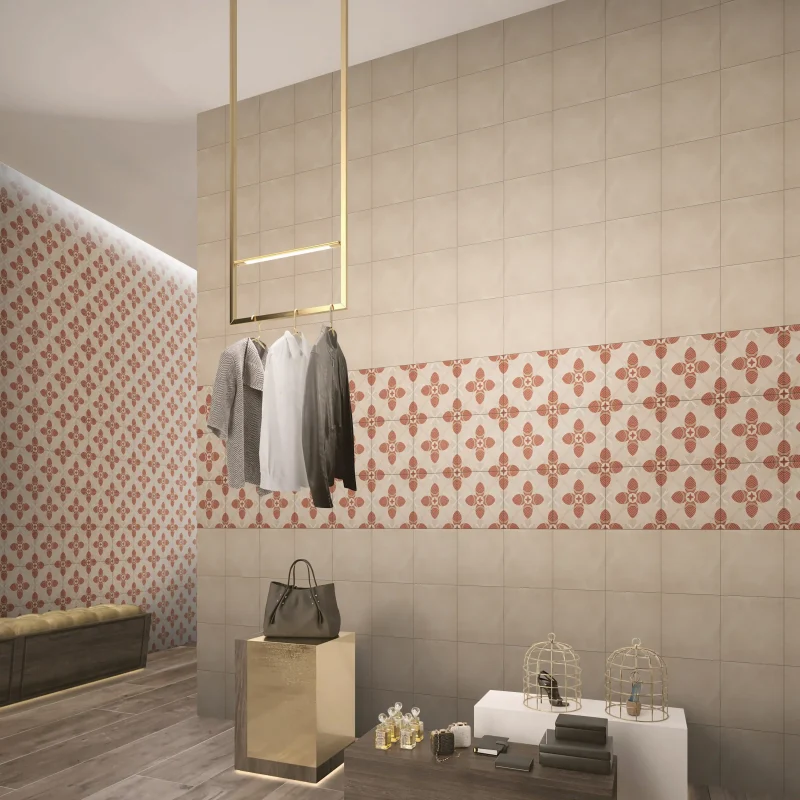In an era where sustainability is at the forefront of industry evolution, Ramirro Ceramica emerges not just as a leading ceramic tile manufacturing company but as a catalyst for innovation and conscious consumer choices. Beyond the creation of exquisite tiling solutions, Ramirro Ceramica spearheads an innovative approach to recycling by transforming discarded plastics into resilient and environmentally friendly tiles. Here in this article you will get to learn about:
- What is PVC Plastic and why should you avoid it.
- What is Vinyl Tiles made of?
- Advantages of Recycled Plastic tiles
- Disadvantages of Recycled Plastic tiles:
- Reducing usage of 100% Virgin PVC plastics for making tiles
- Recycled plastic Tiles : The New Innovation
- Types of new recycled plastic tiles.
- Indoor plastic Marble tiles
- Outdoor Paver plastic tiles
- Interlocking plastic recycled tiles
- Cheaper & Eco-Friendly Alternative to Plastic tiles
- How to buy tiles?
- Related Links:
With a commitment to both craftsmanship and ecological responsibility, this company stands as a beacon of change in the tiling sector, offering customers not just superior products, but the opportunity to make a positive impact through their choices. By embracing groundbreaking methods that repurpose plastic waste into durable tiles, Ramirro Ceramica not only elevates the quality of tiling options available but also empowers consumers to contribute to a sustainable future.
Through a harmonious blend of inventive recycling practices and a dedication to customer welfare, Ramirro Ceramica is not only redefining the norms of tile manufacturing but also fostering a culture of informed decision-making for a greener planet.
What is PVC Plastic and why should you avoid it.
PVC (Polyvinyl Chloride) is a type of plastic that is commonly used in various products due to its versatility, durability, and cost-effectiveness. It’s used in construction materials, pipes, clothing, packaging, toys, and many other everyday items.
However, there are concerns about the use of PVC due to several reasons:
- Toxicity: PVC often contains additives like phthalates and bisphenol-A (BPA) that can leach out of the plastic, especially when exposed to heat or over time. These chemicals have been linked to various health issues, including hormone disruption, developmental problems, and certain cancers.
- Environmental Impact: PVC is not easily recyclable, and its production involves the use of chlorine, which can release toxic substances like dioxins, a group of highly toxic chemicals, during manufacturing and incineration. These chemicals can have harmful effects on the environment and human health.
- Disposal Issues: When PVC products are disposed of improperly, they can release harmful chemicals into the soil and water, posing risks to wildlife and ecosystems.
- Fire Hazard: PVC can produce toxic fumes when burned, contributing to air pollution and presenting health risks in case of fires.
Due to these concerns, some organizations and individuals advocate for reducing the use of PVC in favor of more environmentally friendly and safer alternatives.
It’s important to note that PVC is still widely used in many industries due to its beneficial properties, but efforts are being made to find alternatives that are safer for both human health and the environment. When possible, opting for products made from other plastics or materials that are safer and more sustainable can help minimize exposure to PVC and its potential risks.
What is Vinyl Tiles made of?
Vinyl tiles are flooring materials made primarily from polyvinyl chloride (PVC) and other additives to enhance their properties. The manufacturing process of vinyl tiles typically involves several steps:
- Preparation of Raw Materials: The primary raw material used in vinyl tile production is PVC resin. Other additives such as plasticizers, stabilizers, pigments, and fillers are also prepared and mixed according to specific formulations.
- Mixing and Compounding: The PVC resin and additives are combined in precise quantities in a mixing chamber or extruder. This mixture undergoes compounding, where it is heated and mixed thoroughly to create a homogeneous material. Plasticizers are added to improve flexibility, while stabilizers prevent degradation during processing.
- Calendering or Extrusion: The compounded PVC mixture is then processed through calendering rolls or an extruder to form sheets of the desired thickness. Calendering involves passing the material between heated rollers to create a thin, uniform sheet, while extrusion involves forcing the material through a die to form a continuous shape.
- Tile Formation: The sheets of PVC material are cut into tiles of specific dimensions using cutting machines. These tiles can have various designs, textures, and patterns embossed or printed onto their surface to mimic the appearance of wood, stone, or other materials.
- Backing Application: Some vinyl tiles receive a backing layer for added stability and durability. This backing can be made of materials like fiberglass, foam, or felt.
- Curing or Cooling: The tiles are then subjected to a curing process, which can involve heat treatment or cooling, to finalize their physical properties and ensure they retain their shape.
- Quality Control and Packaging: The tiles undergo quality checks to ensure they meet the required standards for strength, size, color, and other specifications. Once approved, they are packaged and prepared for distribution.
Vinyl tiles come in various types, including luxury vinyl tiles (LVT) and vinyl composition tiles (VCT), each with its own specific manufacturing processes and characteristics. LVT typically includes multiple layers for enhanced durability and aesthetics, while VCT is made from a mixture of vinyl resins, fillers, and colorants, and is known for its resilience and affordability in commercial applications.
Advantages of Recycled Plastic tiles
Environmental Benefits: Utilising recycled plastics in tile production reduces the amount of plastic waste that would otherwise end up in landfills or oceans. This recycling process helps conserve resources and decreases the need for virgin plastic production, contributing to environmental sustainability.
Resource Conservation: By incorporating recycled plastics, these tiles reduce the demand for new raw materials, conserving natural resources such as petroleum, which is a primary component in plastic production.
Versatility: Recycled plastic tiles can be manufactured to resemble various materials like wood, stone, or ceramic. They offer a wide range of design options and can be customized to suit different aesthetics and applications.
Durability: Depending on the manufacturing process and quality control, recycled plastic tiles can exhibit durability and resilience similar to traditional non-recycled tiles. They can withstand wear and tear in high-traffic areas.
Moisture Resistance: Plastic, whether virgin or recycled, inherently resists moisture, making recycled plastic tiles suitable for areas prone to water exposure, such as bathrooms and kitchens.
Disadvantages of Recycled Plastic tiles:
Quality Consistency: The quality of recycled plastic tiles can vary based on the source and composition of the recycled materials. Inconsistent quality might affect durability, appearance, and performance.
Limited Heat Resistance: Recycled plastic tiles may have limited heat resistance compared to some natural materials like ceramic or stone tiles. Extreme heat exposure can cause warping or damage.
Chemical Composition: Some recycled plastics might contain additives or contaminants from their previous use, potentially affecting the performance or safety of the tiles. Careful quality control and material selection are necessary to mitigate this issue.
Cost and Availability: The cost-effectiveness and availability of high-quality recycled materials can fluctuate based on market conditions, recycling processes, and technological advancements. In some cases, these tiles might be more expensive than traditional non-recycled options.
Perception and Aesthetics: Despite their environmental benefits, some consumers might perceive recycled plastic tiles as less desirable due to concerns about appearance or performance compared to natural materials.
Reducing usage of 100% Virgin PVC plastics for making tiles
Reducing the usage of virgin PVC plastic tiles is essential for several reasons, primarily related to environmental and health concerns:
- Environmental Impact: Virgin PVC production involves the use of non-renewable resources like petroleum and natural gas. By reducing the demand for virgin PVC, there’s a decrease in the extraction of these resources, which helps in conserving finite natural resources.
- Energy Consumption: The manufacturing process of virgin PVC tiles requires significant amounts of energy. By minimizing the use of virgin PVC, we can reduce the energy consumption associated with its production.
- Pollution and Emissions: The production of virgin PVC involves the release of harmful chemicals and emissions. Chlorine, a key component in PVC production, can generate dioxins and other toxic substances that can negatively impact the environment and human health.
- Health Concerns: Virgin PVC, along with its associated additives like phthalates and BPA, can pose health risks. These chemicals can leach from PVC products, potentially causing hormone disruption, developmental issues, and other health problems.
- Waste Management: PVC products have a long lifespan but are challenging to recycle. They persist in landfills for extended periods, contributing to environmental pollution. Reducing the usage of virgin PVC decreases the volume of non-recyclable waste.
- Promotion of Sustainable Alternatives: Encouraging the reduction of virgin PVC tiles prompts the development and use of alternative materials that are more environmentally friendly and safer for human health. This shift can drive innovation towards sustainable and recyclable flooring options.
- Regulatory and Industry Trends: Many regulations and industry standards are increasingly focusing on reducing the use of hazardous materials like virgin PVC due to their environmental and health impacts. Being proactive in reducing virgin PVC usage aligns with evolving regulations and consumer preferences for eco-friendly products.
Recycled plastic Tiles : The New Innovation
Recycled plastic tiles represent a notable innovation in sustainable construction materials. These tiles offer several advantages as an eco-friendly alternative to traditional flooring options:
- Environmental Conservation: Utilizing recycled plastics diverts waste from landfills, reducing environmental pollution. By transforming post-consumer or post-industrial plastic waste into tiles, this innovation contributes to a circular economy, minimizing resource depletion.
- Resource Efficiency: Recycling plastics for tile production conserves resources by decreasing the reliance on virgin materials. This process helps in preserving natural resources such as petroleum, which is a primary component in plastic production.
- Energy Savings: Manufacturing recycled plastic tiles generally requires less energy compared to producing tiles from raw materials. Reduced energy consumption contributes to lower greenhouse gas emissions and a smaller carbon footprint.
- Customization and Design Flexibility: Recycled plastic tiles can be designed and customized to resemble various materials like wood, stone, or ceramic. They offer versatility in design, allowing for diverse aesthetic options to suit different spaces and preferences.
- Durability and Performance: When properly manufactured, recycled plastic tiles can exhibit durability and resilience, comparable to traditional non-recycled tiles. They are designed to withstand wear and tear in high-traffic areas.
- Moisture Resistance: Plastic inherently resists moisture, making recycled plastic tiles suitable for areas prone to water exposure, such as bathrooms and kitchens.
- Community and Economic Benefits: The recycling process for these tiles can contribute to local economies by creating jobs in waste collection, sorting, and processing. It also fosters a sense of community engagement in sustainable practices.
Types of new recycled plastic tiles.
- Indoor Plastic Marble Tiles: These recycled plastic tiles are specifically designed for indoor use, offering the elegance of marble while being eco-friendly. They provide a sustainable alternative to traditional marble flooring, offering durability, moisture resistance, and a variety of design options suitable for interior spaces, all while contributing to environmental conservation.
- Outdoor Paver Plastic Tiles: Designed for outdoor applications, these recycled plastic paver tiles are durable, weather-resistant, and suitable for various outdoor surfaces such as patios, walkways, and driveways. They offer enhanced resilience to weather conditions, UV resistance, and can withstand heavy foot traffic, providing an eco-conscious solution for outdoor flooring needs.
- Interlocking Plastic Tiles: These recycled plastic interlocking tiles offer versatility and ease of installation. With their interlocking design, they provide a simple and efficient way to create flooring solutions for both indoor and outdoor spaces. They are durable, customizable, and offer a range of design possibilities while being environmentally friendly by utilizing recycled materials. These tiles can be used in various settings, including residential, commercial, and recreational areas.
Indoor plastic Marble tiles
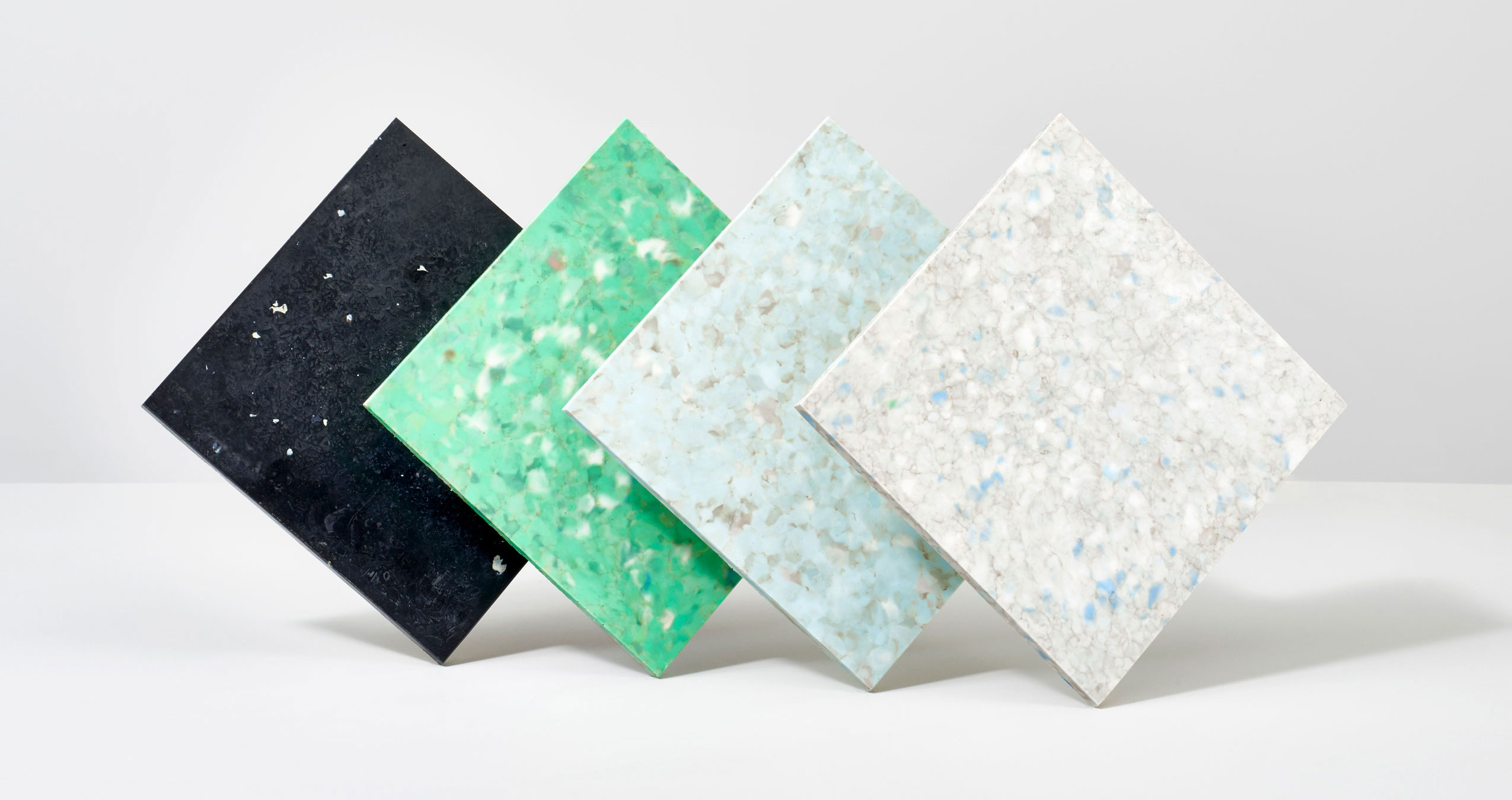 Credit: Better Future Factory
Credit: Better Future Factory
New Marble, a sustainable tile brand that creates wall tiles from recycled PET bottles. A square meter of New Marble tiles is made from 302 plastic bottles and is fully recyclable, promoting the concept of a circular design. These tiles have been utilized in notable projects like the first circular bathroom in The Netherlands and the floating Recycled Park in Rotterdam, constructed from bottles collected from the Maas river. Both the tile designs and the recycling technology are developed by Better Future Factory.
The primary challenge faced was converting waste into a useful building material. The solution offered by New Marble is certified wall tiles made entirely from 100% PET bottle waste, but the project’s current status is on hold since 2018. These tiles were initially designed as a sustainable building material for African countries and are now being further developed for the European market. The goal was to find a low-tech solution for recycling PET without relying on expensive machinery while ensuring scalability. These tiles can be installed using standard tile glue and grout.
Certified by KIWA for indoor applications, these tiles are made from 100% post-consumer recycled plastic, which earned them a Castor Gaea certificate for their innovation and sustainability. Beyond the tile project, Better Future Factory has been involved in initiatives like Energy Floors made from Ocean Waste and repurposing polyurethane waste for Stahl.
Outdoor Paver plastic tiles
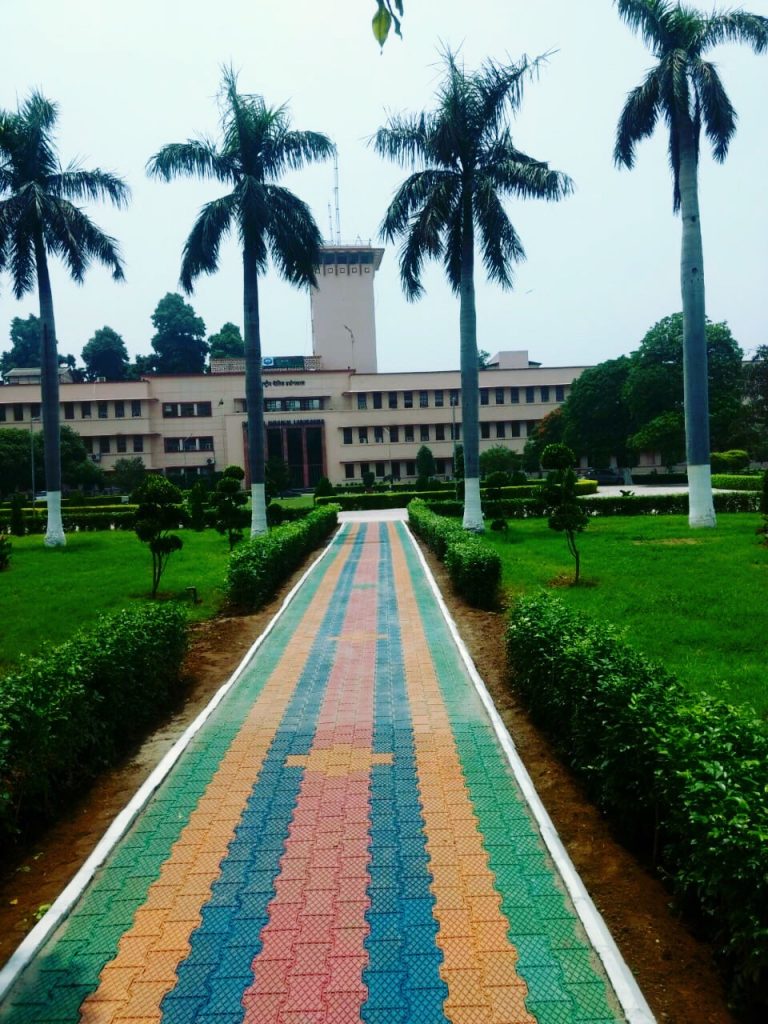
Credit: Shayna Ecounified
A Delhi-based startup, Shayna EcoUnified India Pvt. Ltd., which has successfully utilized 340 tonnes of plastic waste to produce 11 lakh colorful tiles. Paras Saluja, the founder, recognized the environmental issues caused by plastic waste during his travels, leading to his determination to find a sustainable solution. Inspired by an innovative recycling idea from Vietnam, Paras embarked on creating durable tiles from recycled plastics.
Paras faced challenges, aiming to ensure that the tiles had a lifespan of over five years, contrary to the typical lifespan of recycled plastic products. Collaborating with the National Physical Laboratory, he invested in research and development, adopting a technology that could convert plastics into tiles.
The manufacturing process involves recycling specific types of polymers like HDPE, PP, and LDPE, along with fillers to enhance durability. Used plastic waste undergoes crushing, washing, mixing, and compression to create the tiles. The company has collaborated with vendors for raw materials and claims its tiles are antimicrobial, anti-static, and can withstand temperature variations from -25°C to 140°C.
Shayna EcoUnified has supplied tiles for various projects, including the Greater Hyderabad Municipal Corporation’s dog park, Tata Motors, and L’Oréal International. Paras aspires to break the stereotype associated with recycled plastic products, aiming to create designer wall tiles of superior quality to challenge expensive alternatives.
Interlocking plastic recycled tiles
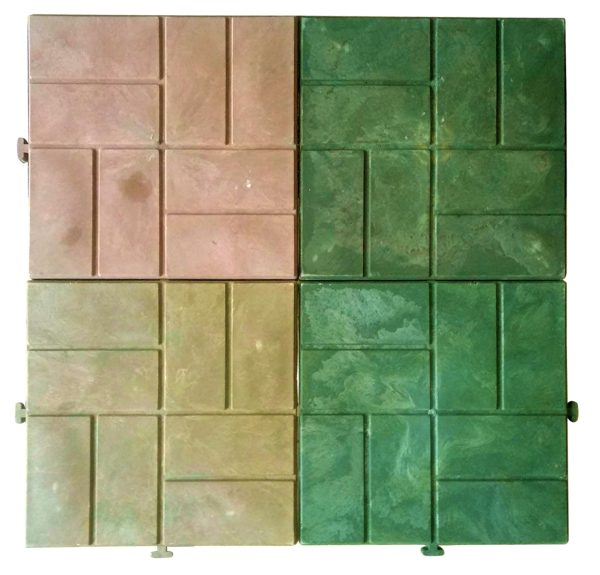
Credit: The Shakti Plastic Industries
The Shakti Plastic Industries introduces Super Shakti Recycled Plastic Tiles, a durable and robust tiling solution crafted from post-consumer plastic waste. These tiles offer remarkable strength and simplicity in installation, embodying the company’s commitment to sustainability and quality.
These tiles find versatile applications, seamlessly enhancing the aesthetics and functionality of spaces such as gardens, societies, offices, and educational institutions. Their adaptability allows for effortless integration into various environments, adding both style and practicality to different settings.
Technical specifications detail that the tiles are crafted from Recycled MLP material, with dimensions of 300x300x20mm and weighing 1 kg each. They boast essential properties like fire resistance, waterproofing, sturdiness, and toughness.
In addition to recycled plastic tiles, the Shakti Plastic Industries offers an array of other recycled products like dustbins, benches, flower pots, and pushbins, all constructed from recycled materials, aligning with the company’s commitment to reducing carbon footprints and promoting sustainability.
Cheaper & Eco-Friendly Alternative to Plastic tiles
When it comes to seeking a cost-effective and environmentally friendly alternative to traditional plastic tiles, ceramic and porcelain tiles stand out as an excellent option. Ramirro Ceramica, a prominent manufacturer and exporter of tiles, offers a wide range of ceramic and porcelain tiles that align with these criteria.
Ceramic and porcelain tiles present a compelling alternative to plastic tiles due to their various advantages. First and foremost, these tiles are manufactured from natural materials like clay, minerals, and water, making them eco-friendly and sustainable. Unlike plastic tiles that contribute to environmental pollution and pose disposal challenges, ceramic and porcelain tiles are produced using natural resources without harmful additives or chemicals, making them an eco-conscious choice.
In addition to their eco-friendliness, ceramic and porcelain tiles offer exceptional durability and longevity. They are resistant to wear, scratches, and fading, ensuring a longer lifespan compared to plastic tiles. This durability makes them a cost-effective option in the long run, as they require minimal maintenance and have a lower chance of needing frequent replacements.
Ramirro Ceramica’s expertise in manufacturing ceramic and porcelain tiles ensures a wide array of design options, colors, textures, and sizes suitable for various applications. Whether it’s for flooring, walls, or decorative purposes, these tiles offer versatility and aesthetic appeal, providing an attractive yet affordable solution for residential, commercial, or industrial spaces.
Moreover, ceramic and porcelain tiles have excellent thermal properties, keeping spaces cooler in hot weather and helping maintain a comfortable indoor temperature. They are also moisture-resistant, making them ideal for areas prone to humidity or water exposure, such as bathrooms, kitchens, or outdoor settings.
In summary, Ramirro Ceramica’s ceramic and porcelain tiles offer a compelling alternative to plastic tiles. Their eco-friendly nature, durability, versatility, and aesthetic appeal make them an excellent choice for those seeking a cost-effective and sustainable tiling solution for various applications.
How to buy tiles?
Ramirro Ceramica provides customers with convenient options to purchase tiles both through offline and online shopping platforms, ensuring accessibility and flexibility in acquiring their high-quality ceramic and porcelain tiles.
Offline Purchase:
- Physical Stores: Ramirro Ceramica has a network of authorized dealers, distributors, and retail outlets across various locations. Customers can visit these physical stores to explore the wide range of tiles available, seek guidance from sales representatives, view samples, and make their purchases in person. These showrooms often offer a hands-on experience, allowing customers to visualize and select the most suitable tiles for their projects.
Online Purchase:
- Company Website: Ramirro Ceramica’s official website serves as an online platform where customers can browse through their extensive catalog of tiles. The website showcases detailed product descriptions, specifications, images, and design options. Customers can place orders directly through the website by selecting their desired tiles, specifying quantities, and making secure online payments. Additionally, the website may offer virtual tools for room visualization or samples for purchase.
You can also chat with our tiling expert for FREE advice
Related Links:
- Best Garage Tiles | Types of Garage Floorings
- Major Difference Between Vinyl Tiles vs Porcelain Tiles
- Best Outdoor Patio Tiles for Floor | Buy direct …
- Laminate vs Vinyl vs Porcelain tiles vs Engineered Wood …
- Top 500+ Garage Floor Tiles Design in 2023
- Best Non Slip Bathroom Floor Tiles Collection
- Best Office Floor Tiles By Ramirro Ceramica – 2023
- Best Bathroom Flooring Tiles Ideas 2023 – Ramirro
- Top 10 Tiles Trends 2023 | New Designs for Every …
- Tiles in San Francisco City: Shop Ceramic & Porcelain at …
Why Should You Trust us?
Here’s what you get out of our article. Our team have various Ceramic Experts with experience of more than 25 Years, researches on problems our customer faces in tiling industry.
Ramirro Ceramica, – One of The Leading Tiles Manufacturer and Supplier globally, helps you people gain knowledgeable insight before making your purchase decision for products related to the floor and wall tiles.
So, we have closely monitored all kinds of trends in the ceramic tiles manufacturing world, from the old days of clay and plain color to modern digital, realistic-looking designs printed on ceramics with high-depth effects.
Our tiling Experts have seen thousands of different tiles patterns, sizes, materials, pricing, and installation techniques throughout their career.
Their expertise shared with you in simplified and organised way, helps you choose and make better decision before purchasing any flooring option available in market.
Brief about Company:
Ramirro is one of the finest Tiles manufacturers in India manufacturing porcelain and ceramic tiles. Our products have a variety of sizes and types of tiles ranging from Ceramics, porcelain, Full body etc. This helps you choose the perfect fit for your project. Plus, our collection will help you get inspiration from the architect’s design.
Here’s some more helpful links that showcase our users trust on Ramirro Ceramica Brand:
– Growth in International Market
– Trusted and Licensed Exporter
– Manufacturing Plant in India
Here’s our social proof by LinkedIn competing with top known global tiling brands:


